Analyzing the Effectiveness of CBT for Mental Disorder Treatment
VerifiedAdded on 2022/09/23
|8
|1976
|24
Essay
AI Summary
This essay examines the effectiveness of Cognitive Behavioral Therapy (CBT) as a treatment for various mental disorders, including depression, anxiety, and PTSD. It highlights the core principles of CBT, which focus on addressing maladaptive cognitions and behaviors to alleviate psychological distress. The essay discusses how CBT helps patients identify and challenge negative thought patterns, develop coping mechanisms, and manage symptoms. It also compares CBT to other treatment approaches, such as pharmacotherapy, and emphasizes the benefits of combining CBT with medication. Furthermore, the essay explores the application of CBT in diverse clinical settings and its cross-cultural effectiveness. It concludes that CBT is a gold standard in psychotherapy due to its evidence-based approach and its ability to address the root causes of mental illnesses, offering long-term relief and preventing relapse. The essay also acknowledges the need for further development to address the needs of clients who do not respond to CBT, suggesting a move towards integrative psychotherapy.
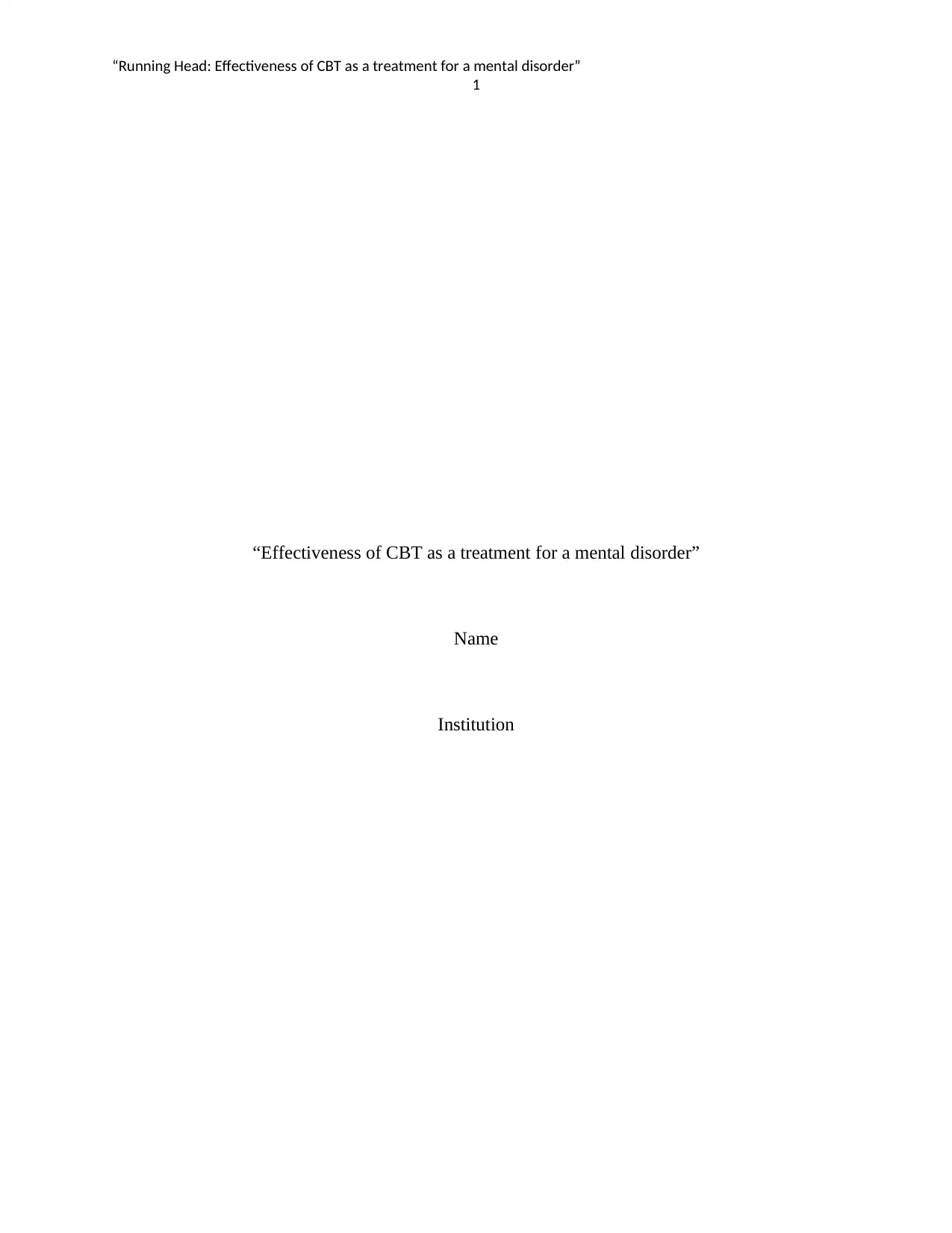
“Running Head: Effectiveness of CBT as a treatment for a mental disorder”
1
“Effectiveness of CBT as a treatment for a mental disorder”
Name
Institution
1
“Effectiveness of CBT as a treatment for a mental disorder”
Name
Institution
Paraphrase This Document
Need a fresh take? Get an instant paraphrase of this document with our AI Paraphraser
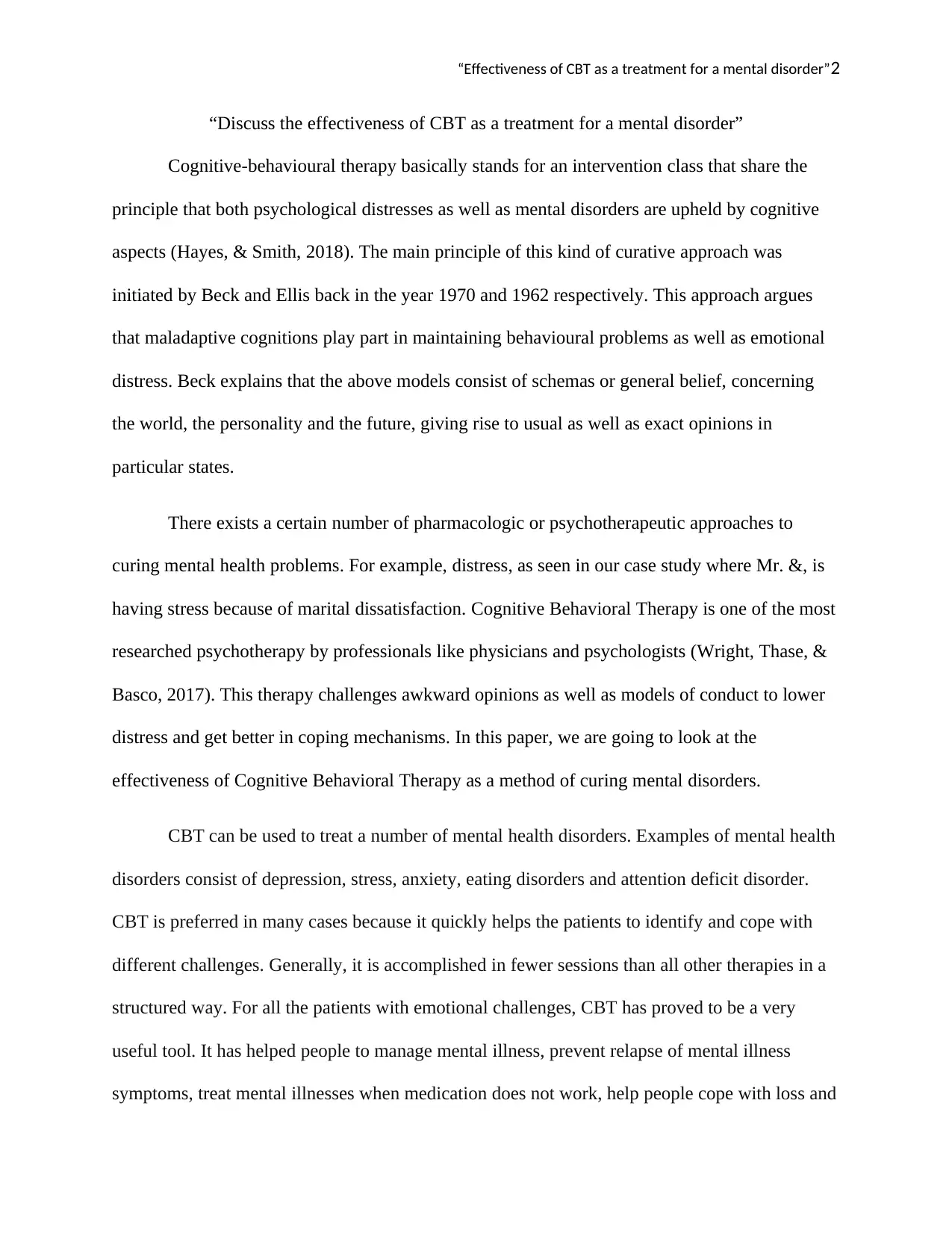
“Effectiveness of CBT as a treatment for a mental disorder”2
“Discuss the effectiveness of CBT as a treatment for a mental disorder”
Cognitive-behavioural therapy basically stands for an intervention class that share the
principle that both psychological distresses as well as mental disorders are upheld by cognitive
aspects (Hayes, & Smith, 2018). The main principle of this kind of curative approach was
initiated by Beck and Ellis back in the year 1970 and 1962 respectively. This approach argues
that maladaptive cognitions play part in maintaining behavioural problems as well as emotional
distress. Beck explains that the above models consist of schemas or general belief, concerning
the world, the personality and the future, giving rise to usual as well as exact opinions in
particular states.
There exists a certain number of pharmacologic or psychotherapeutic approaches to
curing mental health problems. For example, distress, as seen in our case study where Mr. &, is
having stress because of marital dissatisfaction. Cognitive Behavioral Therapy is one of the most
researched psychotherapy by professionals like physicians and psychologists (Wright, Thase, &
Basco, 2017). This therapy challenges awkward opinions as well as models of conduct to lower
distress and get better in coping mechanisms. In this paper, we are going to look at the
effectiveness of Cognitive Behavioral Therapy as a method of curing mental disorders.
CBT can be used to treat a number of mental health disorders. Examples of mental health
disorders consist of depression, stress, anxiety, eating disorders and attention deficit disorder.
CBT is preferred in many cases because it quickly helps the patients to identify and cope with
different challenges. Generally, it is accomplished in fewer sessions than all other therapies in a
structured way. For all the patients with emotional challenges, CBT has proved to be a very
useful tool. It has helped people to manage mental illness, prevent relapse of mental illness
symptoms, treat mental illnesses when medication does not work, help people cope with loss and
“Discuss the effectiveness of CBT as a treatment for a mental disorder”
Cognitive-behavioural therapy basically stands for an intervention class that share the
principle that both psychological distresses as well as mental disorders are upheld by cognitive
aspects (Hayes, & Smith, 2018). The main principle of this kind of curative approach was
initiated by Beck and Ellis back in the year 1970 and 1962 respectively. This approach argues
that maladaptive cognitions play part in maintaining behavioural problems as well as emotional
distress. Beck explains that the above models consist of schemas or general belief, concerning
the world, the personality and the future, giving rise to usual as well as exact opinions in
particular states.
There exists a certain number of pharmacologic or psychotherapeutic approaches to
curing mental health problems. For example, distress, as seen in our case study where Mr. &, is
having stress because of marital dissatisfaction. Cognitive Behavioral Therapy is one of the most
researched psychotherapy by professionals like physicians and psychologists (Wright, Thase, &
Basco, 2017). This therapy challenges awkward opinions as well as models of conduct to lower
distress and get better in coping mechanisms. In this paper, we are going to look at the
effectiveness of Cognitive Behavioral Therapy as a method of curing mental disorders.
CBT can be used to treat a number of mental health disorders. Examples of mental health
disorders consist of depression, stress, anxiety, eating disorders and attention deficit disorder.
CBT is preferred in many cases because it quickly helps the patients to identify and cope with
different challenges. Generally, it is accomplished in fewer sessions than all other therapies in a
structured way. For all the patients with emotional challenges, CBT has proved to be a very
useful tool. It has helped people to manage mental illness, prevent relapse of mental illness
symptoms, treat mental illnesses when medication does not work, help people cope with loss and
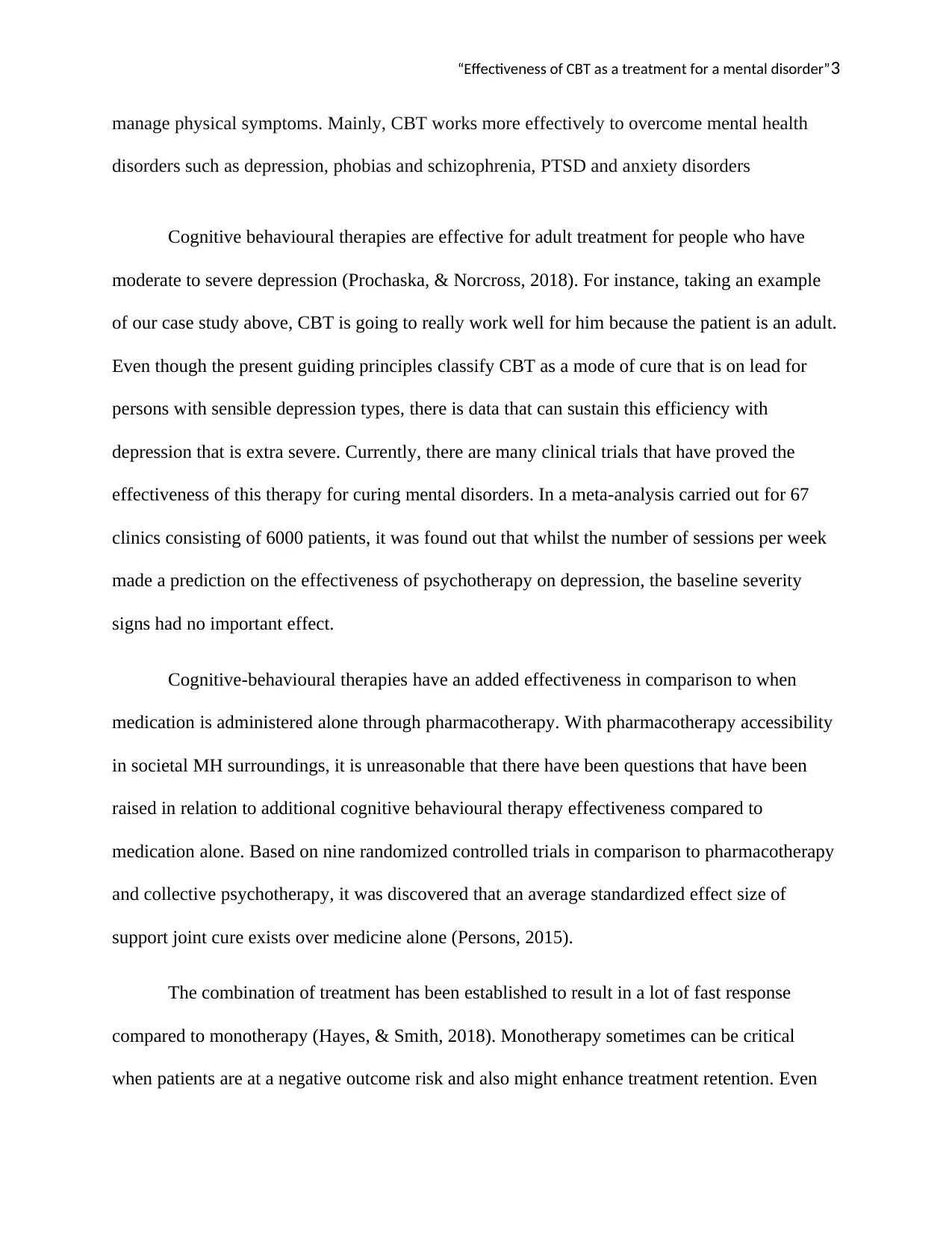
“Effectiveness of CBT as a treatment for a mental disorder”3
manage physical symptoms. Mainly, CBT works more effectively to overcome mental health
disorders such as depression, phobias and schizophrenia, PTSD and anxiety disorders
Cognitive behavioural therapies are effective for adult treatment for people who have
moderate to severe depression (Prochaska, & Norcross, 2018). For instance, taking an example
of our case study above, CBT is going to really work well for him because the patient is an adult.
Even though the present guiding principles classify CBT as a mode of cure that is on lead for
persons with sensible depression types, there is data that can sustain this efficiency with
depression that is extra severe. Currently, there are many clinical trials that have proved the
effectiveness of this therapy for curing mental disorders. In a meta-analysis carried out for 67
clinics consisting of 6000 patients, it was found out that whilst the number of sessions per week
made a prediction on the effectiveness of psychotherapy on depression, the baseline severity
signs had no important effect.
Cognitive-behavioural therapies have an added effectiveness in comparison to when
medication is administered alone through pharmacotherapy. With pharmacotherapy accessibility
in societal MH surroundings, it is unreasonable that there have been questions that have been
raised in relation to additional cognitive behavioural therapy effectiveness compared to
medication alone. Based on nine randomized controlled trials in comparison to pharmacotherapy
and collective psychotherapy, it was discovered that an average standardized effect size of
support joint cure exists over medicine alone (Persons, 2015).
The combination of treatment has been established to result in a lot of fast response
compared to monotherapy (Hayes, & Smith, 2018). Monotherapy sometimes can be critical
when patients are at a negative outcome risk and also might enhance treatment retention. Even
manage physical symptoms. Mainly, CBT works more effectively to overcome mental health
disorders such as depression, phobias and schizophrenia, PTSD and anxiety disorders
Cognitive behavioural therapies are effective for adult treatment for people who have
moderate to severe depression (Prochaska, & Norcross, 2018). For instance, taking an example
of our case study above, CBT is going to really work well for him because the patient is an adult.
Even though the present guiding principles classify CBT as a mode of cure that is on lead for
persons with sensible depression types, there is data that can sustain this efficiency with
depression that is extra severe. Currently, there are many clinical trials that have proved the
effectiveness of this therapy for curing mental disorders. In a meta-analysis carried out for 67
clinics consisting of 6000 patients, it was found out that whilst the number of sessions per week
made a prediction on the effectiveness of psychotherapy on depression, the baseline severity
signs had no important effect.
Cognitive-behavioural therapies have an added effectiveness in comparison to when
medication is administered alone through pharmacotherapy. With pharmacotherapy accessibility
in societal MH surroundings, it is unreasonable that there have been questions that have been
raised in relation to additional cognitive behavioural therapy effectiveness compared to
medication alone. Based on nine randomized controlled trials in comparison to pharmacotherapy
and collective psychotherapy, it was discovered that an average standardized effect size of
support joint cure exists over medicine alone (Persons, 2015).
The combination of treatment has been established to result in a lot of fast response
compared to monotherapy (Hayes, & Smith, 2018). Monotherapy sometimes can be critical
when patients are at a negative outcome risk and also might enhance treatment retention. Even
⊘ This is a preview!⊘
Do you want full access?
Subscribe today to unlock all pages.

Trusted by 1+ million students worldwide
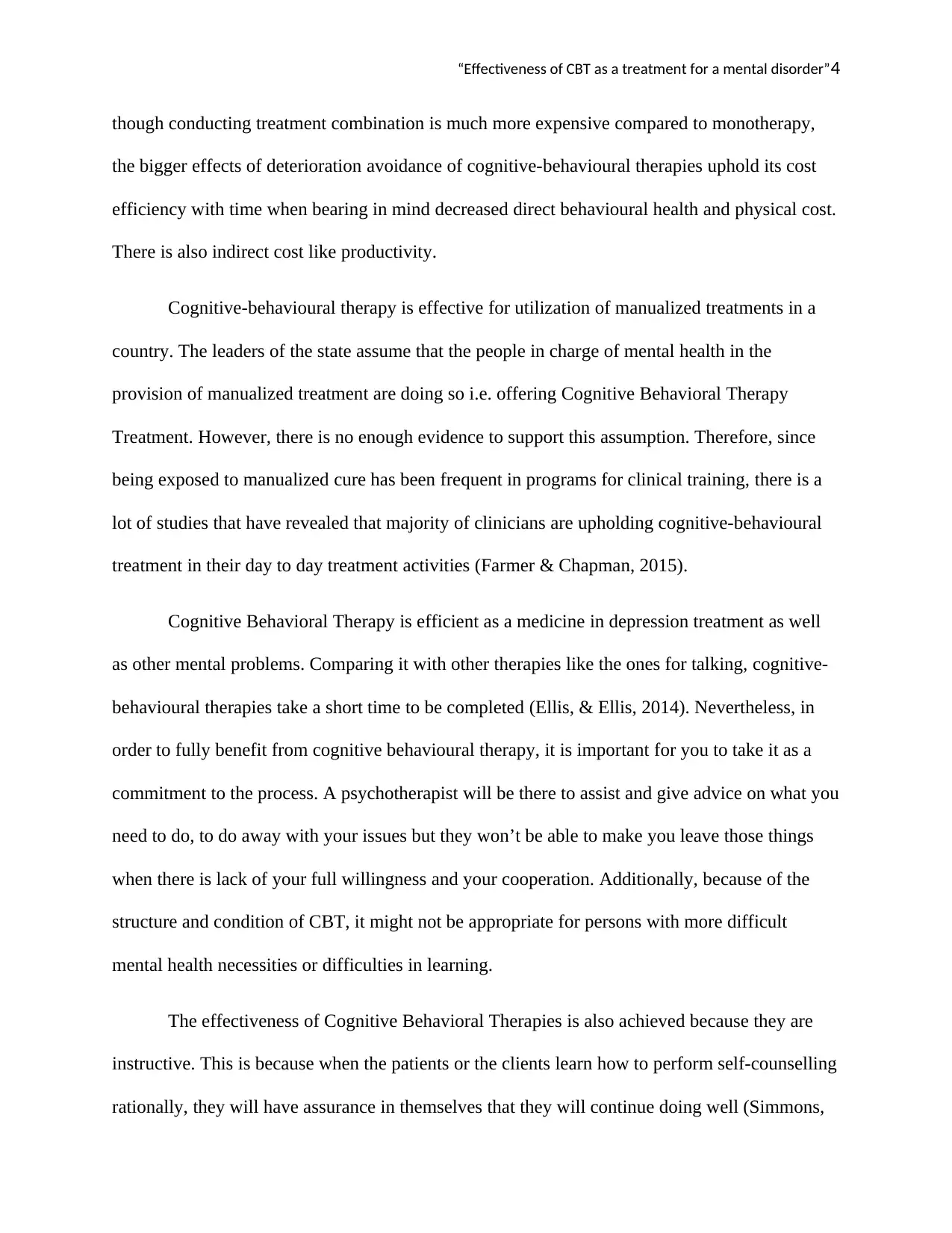
“Effectiveness of CBT as a treatment for a mental disorder”4
though conducting treatment combination is much more expensive compared to monotherapy,
the bigger effects of deterioration avoidance of cognitive-behavioural therapies uphold its cost
efficiency with time when bearing in mind decreased direct behavioural health and physical cost.
There is also indirect cost like productivity.
Cognitive-behavioural therapy is effective for utilization of manualized treatments in a
country. The leaders of the state assume that the people in charge of mental health in the
provision of manualized treatment are doing so i.e. offering Cognitive Behavioral Therapy
Treatment. However, there is no enough evidence to support this assumption. Therefore, since
being exposed to manualized cure has been frequent in programs for clinical training, there is a
lot of studies that have revealed that majority of clinicians are upholding cognitive-behavioural
treatment in their day to day treatment activities (Farmer & Chapman, 2015).
Cognitive Behavioral Therapy is efficient as a medicine in depression treatment as well
as other mental problems. Comparing it with other therapies like the ones for talking, cognitive-
behavioural therapies take a short time to be completed (Ellis, & Ellis, 2014). Nevertheless, in
order to fully benefit from cognitive behavioural therapy, it is important for you to take it as a
commitment to the process. A psychotherapist will be there to assist and give advice on what you
need to do, to do away with your issues but they won’t be able to make you leave those things
when there is lack of your full willingness and your cooperation. Additionally, because of the
structure and condition of CBT, it might not be appropriate for persons with more difficult
mental health necessities or difficulties in learning.
The effectiveness of Cognitive Behavioral Therapies is also achieved because they are
instructive. This is because when the patients or the clients learn how to perform self-counselling
rationally, they will have assurance in themselves that they will continue doing well (Simmons,
though conducting treatment combination is much more expensive compared to monotherapy,
the bigger effects of deterioration avoidance of cognitive-behavioural therapies uphold its cost
efficiency with time when bearing in mind decreased direct behavioural health and physical cost.
There is also indirect cost like productivity.
Cognitive-behavioural therapy is effective for utilization of manualized treatments in a
country. The leaders of the state assume that the people in charge of mental health in the
provision of manualized treatment are doing so i.e. offering Cognitive Behavioral Therapy
Treatment. However, there is no enough evidence to support this assumption. Therefore, since
being exposed to manualized cure has been frequent in programs for clinical training, there is a
lot of studies that have revealed that majority of clinicians are upholding cognitive-behavioural
treatment in their day to day treatment activities (Farmer & Chapman, 2015).
Cognitive Behavioral Therapy is efficient as a medicine in depression treatment as well
as other mental problems. Comparing it with other therapies like the ones for talking, cognitive-
behavioural therapies take a short time to be completed (Ellis, & Ellis, 2014). Nevertheless, in
order to fully benefit from cognitive behavioural therapy, it is important for you to take it as a
commitment to the process. A psychotherapist will be there to assist and give advice on what you
need to do, to do away with your issues but they won’t be able to make you leave those things
when there is lack of your full willingness and your cooperation. Additionally, because of the
structure and condition of CBT, it might not be appropriate for persons with more difficult
mental health necessities or difficulties in learning.
The effectiveness of Cognitive Behavioral Therapies is also achieved because they are
instructive. This is because when the patients or the clients learn how to perform self-counselling
rationally, they will have assurance in themselves that they will continue doing well (Simmons,
Paraphrase This Document
Need a fresh take? Get an instant paraphrase of this document with our AI Paraphraser
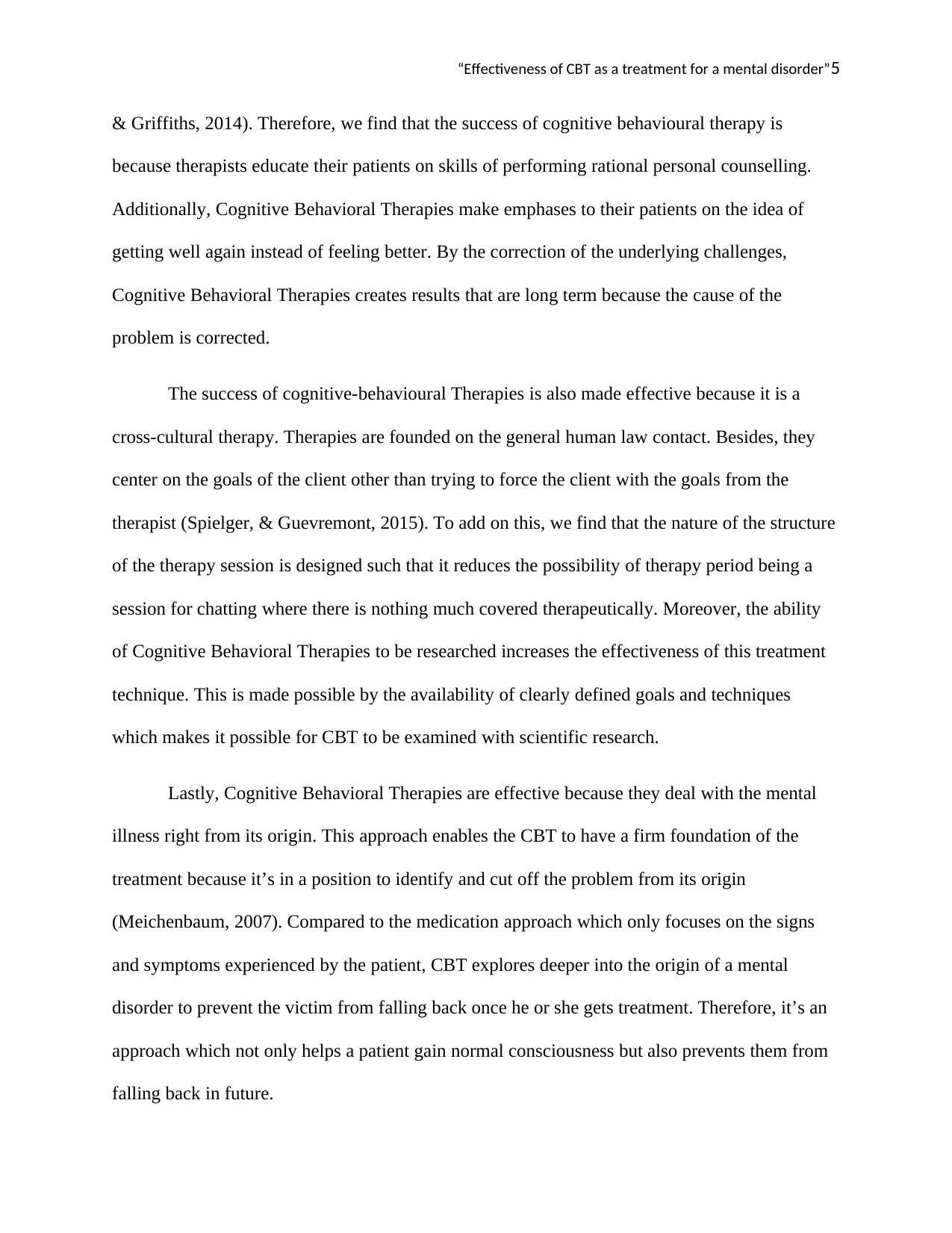
“Effectiveness of CBT as a treatment for a mental disorder”5
& Griffiths, 2014). Therefore, we find that the success of cognitive behavioural therapy is
because therapists educate their patients on skills of performing rational personal counselling.
Additionally, Cognitive Behavioral Therapies make emphases to their patients on the idea of
getting well again instead of feeling better. By the correction of the underlying challenges,
Cognitive Behavioral Therapies creates results that are long term because the cause of the
problem is corrected.
The success of cognitive-behavioural Therapies is also made effective because it is a
cross-cultural therapy. Therapies are founded on the general human law contact. Besides, they
center on the goals of the client other than trying to force the client with the goals from the
therapist (Spielger, & Guevremont, 2015). To add on this, we find that the nature of the structure
of the therapy session is designed such that it reduces the possibility of therapy period being a
session for chatting where there is nothing much covered therapeutically. Moreover, the ability
of Cognitive Behavioral Therapies to be researched increases the effectiveness of this treatment
technique. This is made possible by the availability of clearly defined goals and techniques
which makes it possible for CBT to be examined with scientific research.
Lastly, Cognitive Behavioral Therapies are effective because they deal with the mental
illness right from its origin. This approach enables the CBT to have a firm foundation of the
treatment because it’s in a position to identify and cut off the problem from its origin
(Meichenbaum, 2007). Compared to the medication approach which only focuses on the signs
and symptoms experienced by the patient, CBT explores deeper into the origin of a mental
disorder to prevent the victim from falling back once he or she gets treatment. Therefore, it’s an
approach which not only helps a patient gain normal consciousness but also prevents them from
falling back in future.
& Griffiths, 2014). Therefore, we find that the success of cognitive behavioural therapy is
because therapists educate their patients on skills of performing rational personal counselling.
Additionally, Cognitive Behavioral Therapies make emphases to their patients on the idea of
getting well again instead of feeling better. By the correction of the underlying challenges,
Cognitive Behavioral Therapies creates results that are long term because the cause of the
problem is corrected.
The success of cognitive-behavioural Therapies is also made effective because it is a
cross-cultural therapy. Therapies are founded on the general human law contact. Besides, they
center on the goals of the client other than trying to force the client with the goals from the
therapist (Spielger, & Guevremont, 2015). To add on this, we find that the nature of the structure
of the therapy session is designed such that it reduces the possibility of therapy period being a
session for chatting where there is nothing much covered therapeutically. Moreover, the ability
of Cognitive Behavioral Therapies to be researched increases the effectiveness of this treatment
technique. This is made possible by the availability of clearly defined goals and techniques
which makes it possible for CBT to be examined with scientific research.
Lastly, Cognitive Behavioral Therapies are effective because they deal with the mental
illness right from its origin. This approach enables the CBT to have a firm foundation of the
treatment because it’s in a position to identify and cut off the problem from its origin
(Meichenbaum, 2007). Compared to the medication approach which only focuses on the signs
and symptoms experienced by the patient, CBT explores deeper into the origin of a mental
disorder to prevent the victim from falling back once he or she gets treatment. Therefore, it’s an
approach which not only helps a patient gain normal consciousness but also prevents them from
falling back in future.
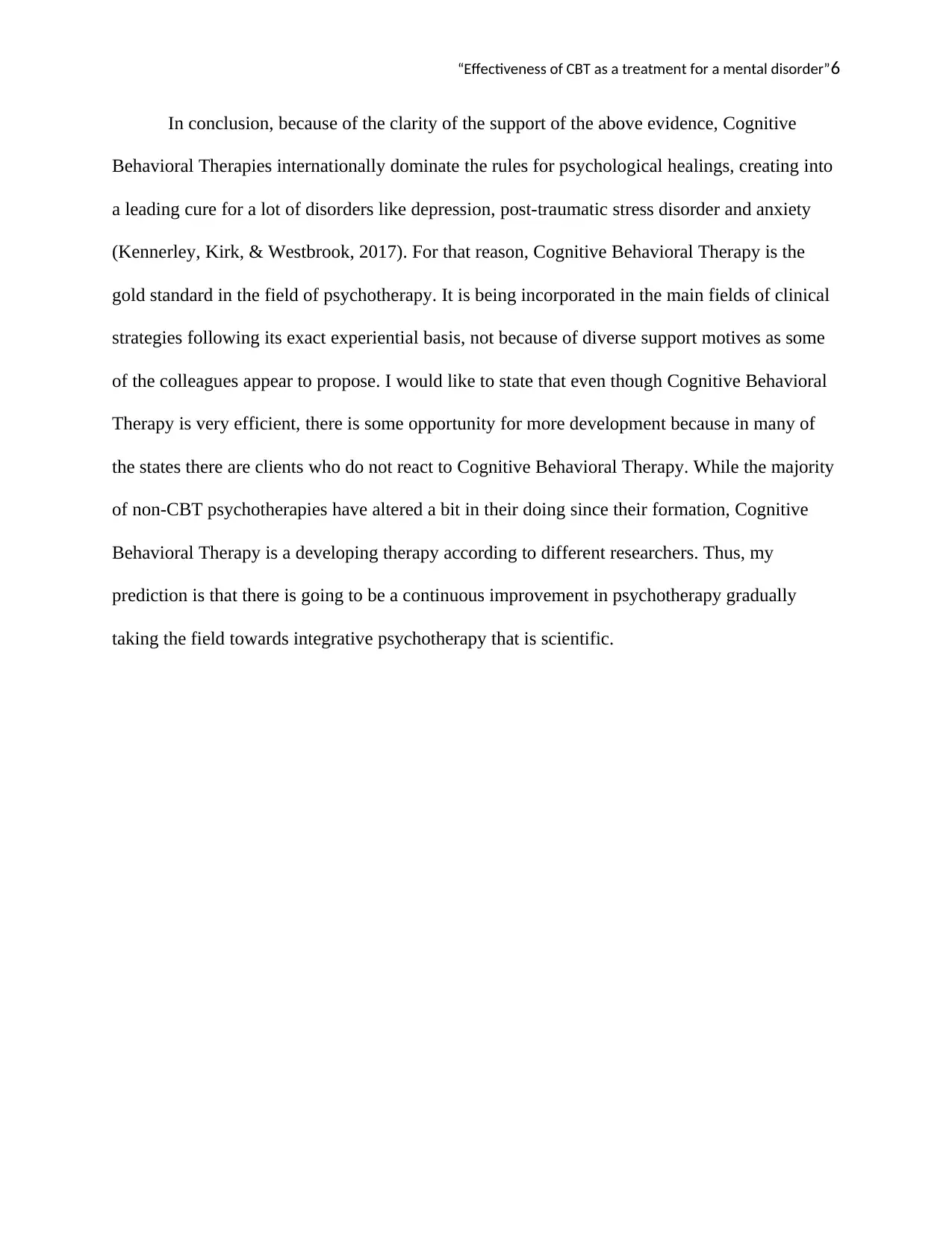
“Effectiveness of CBT as a treatment for a mental disorder”6
In conclusion, because of the clarity of the support of the above evidence, Cognitive
Behavioral Therapies internationally dominate the rules for psychological healings, creating into
a leading cure for a lot of disorders like depression, post-traumatic stress disorder and anxiety
(Kennerley, Kirk, & Westbrook, 2017). For that reason, Cognitive Behavioral Therapy is the
gold standard in the field of psychotherapy. It is being incorporated in the main fields of clinical
strategies following its exact experiential basis, not because of diverse support motives as some
of the colleagues appear to propose. I would like to state that even though Cognitive Behavioral
Therapy is very efficient, there is some opportunity for more development because in many of
the states there are clients who do not react to Cognitive Behavioral Therapy. While the majority
of non-CBT psychotherapies have altered a bit in their doing since their formation, Cognitive
Behavioral Therapy is a developing therapy according to different researchers. Thus, my
prediction is that there is going to be a continuous improvement in psychotherapy gradually
taking the field towards integrative psychotherapy that is scientific.
In conclusion, because of the clarity of the support of the above evidence, Cognitive
Behavioral Therapies internationally dominate the rules for psychological healings, creating into
a leading cure for a lot of disorders like depression, post-traumatic stress disorder and anxiety
(Kennerley, Kirk, & Westbrook, 2017). For that reason, Cognitive Behavioral Therapy is the
gold standard in the field of psychotherapy. It is being incorporated in the main fields of clinical
strategies following its exact experiential basis, not because of diverse support motives as some
of the colleagues appear to propose. I would like to state that even though Cognitive Behavioral
Therapy is very efficient, there is some opportunity for more development because in many of
the states there are clients who do not react to Cognitive Behavioral Therapy. While the majority
of non-CBT psychotherapies have altered a bit in their doing since their formation, Cognitive
Behavioral Therapy is a developing therapy according to different researchers. Thus, my
prediction is that there is going to be a continuous improvement in psychotherapy gradually
taking the field towards integrative psychotherapy that is scientific.
⊘ This is a preview!⊘
Do you want full access?
Subscribe today to unlock all pages.

Trusted by 1+ million students worldwide
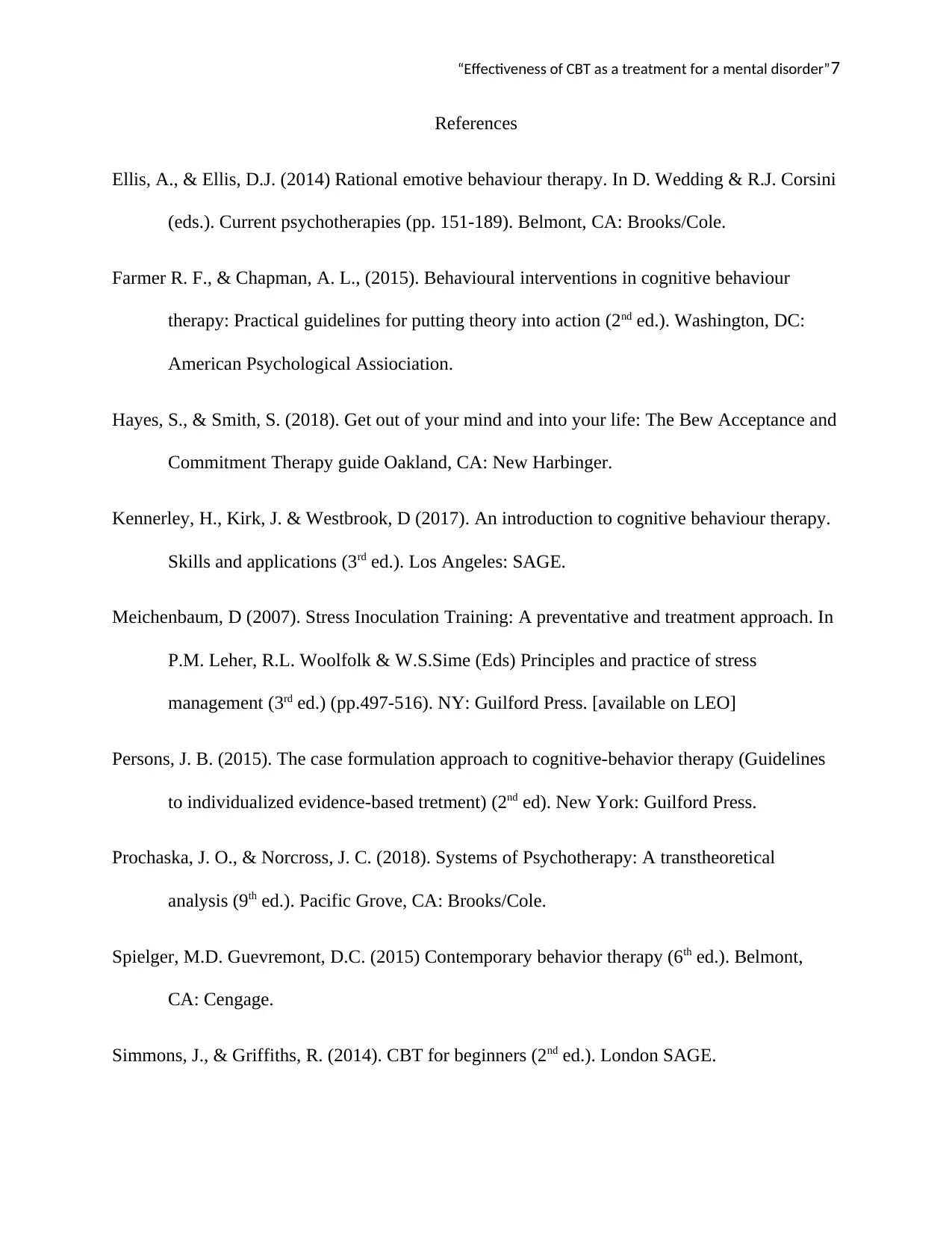
“Effectiveness of CBT as a treatment for a mental disorder”7
References
Ellis, A., & Ellis, D.J. (2014) Rational emotive behaviour therapy. In D. Wedding & R.J. Corsini
(eds.). Current psychotherapies (pp. 151-189). Belmont, CA: Brooks/Cole.
Farmer R. F., & Chapman, A. L., (2015). Behavioural interventions in cognitive behaviour
therapy: Practical guidelines for putting theory into action (2nd ed.). Washington, DC:
American Psychological Assiociation.
Hayes, S., & Smith, S. (2018). Get out of your mind and into your life: The Bew Acceptance and
Commitment Therapy guide Oakland, CA: New Harbinger.
Kennerley, H., Kirk, J. & Westbrook, D (2017). An introduction to cognitive behaviour therapy.
Skills and applications (3rd ed.). Los Angeles: SAGE.
Meichenbaum, D (2007). Stress Inoculation Training: A preventative and treatment approach. In
P.M. Leher, R.L. Woolfolk & W.S.Sime (Eds) Principles and practice of stress
management (3rd ed.) (pp.497-516). NY: Guilford Press. [available on LEO]
Persons, J. B. (2015). The case formulation approach to cognitive-behavior therapy (Guidelines
to individualized evidence-based tretment) (2nd ed). New York: Guilford Press.
Prochaska, J. O., & Norcross, J. C. (2018). Systems of Psychotherapy: A transtheoretical
analysis (9th ed.). Pacific Grove, CA: Brooks/Cole.
Spielger, M.D. Guevremont, D.C. (2015) Contemporary behavior therapy (6th ed.). Belmont,
CA: Cengage.
Simmons, J., & Griffiths, R. (2014). CBT for beginners (2nd ed.). London SAGE.
References
Ellis, A., & Ellis, D.J. (2014) Rational emotive behaviour therapy. In D. Wedding & R.J. Corsini
(eds.). Current psychotherapies (pp. 151-189). Belmont, CA: Brooks/Cole.
Farmer R. F., & Chapman, A. L., (2015). Behavioural interventions in cognitive behaviour
therapy: Practical guidelines for putting theory into action (2nd ed.). Washington, DC:
American Psychological Assiociation.
Hayes, S., & Smith, S. (2018). Get out of your mind and into your life: The Bew Acceptance and
Commitment Therapy guide Oakland, CA: New Harbinger.
Kennerley, H., Kirk, J. & Westbrook, D (2017). An introduction to cognitive behaviour therapy.
Skills and applications (3rd ed.). Los Angeles: SAGE.
Meichenbaum, D (2007). Stress Inoculation Training: A preventative and treatment approach. In
P.M. Leher, R.L. Woolfolk & W.S.Sime (Eds) Principles and practice of stress
management (3rd ed.) (pp.497-516). NY: Guilford Press. [available on LEO]
Persons, J. B. (2015). The case formulation approach to cognitive-behavior therapy (Guidelines
to individualized evidence-based tretment) (2nd ed). New York: Guilford Press.
Prochaska, J. O., & Norcross, J. C. (2018). Systems of Psychotherapy: A transtheoretical
analysis (9th ed.). Pacific Grove, CA: Brooks/Cole.
Spielger, M.D. Guevremont, D.C. (2015) Contemporary behavior therapy (6th ed.). Belmont,
CA: Cengage.
Simmons, J., & Griffiths, R. (2014). CBT for beginners (2nd ed.). London SAGE.
Paraphrase This Document
Need a fresh take? Get an instant paraphrase of this document with our AI Paraphraser
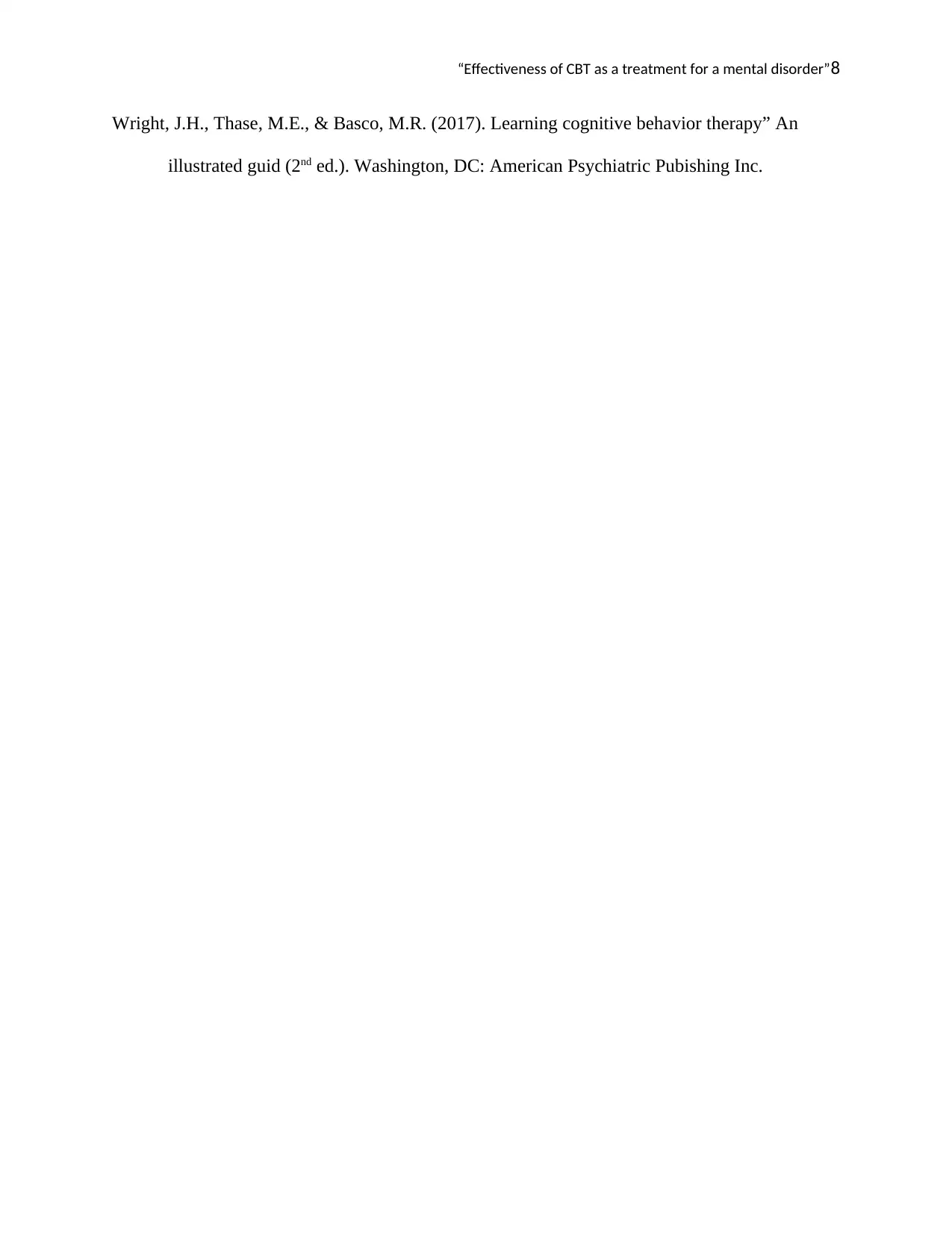
“Effectiveness of CBT as a treatment for a mental disorder”8
Wright, J.H., Thase, M.E., & Basco, M.R. (2017). Learning cognitive behavior therapy” An
illustrated guid (2nd ed.). Washington, DC: American Psychiatric Pubishing Inc.
Wright, J.H., Thase, M.E., & Basco, M.R. (2017). Learning cognitive behavior therapy” An
illustrated guid (2nd ed.). Washington, DC: American Psychiatric Pubishing Inc.
1 out of 8
Related Documents
Your All-in-One AI-Powered Toolkit for Academic Success.
+13062052269
info@desklib.com
Available 24*7 on WhatsApp / Email
![[object Object]](/_next/static/media/star-bottom.7253800d.svg)
Unlock your academic potential
Copyright © 2020–2026 A2Z Services. All Rights Reserved. Developed and managed by ZUCOL.





